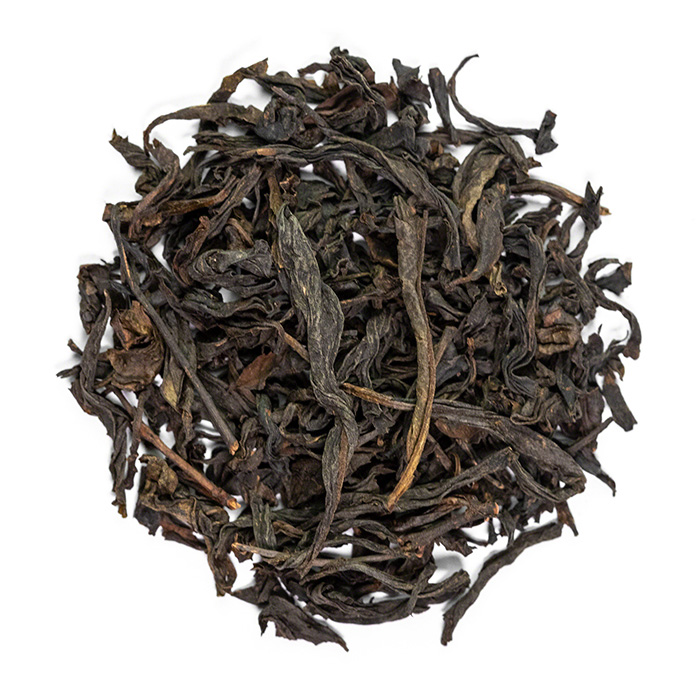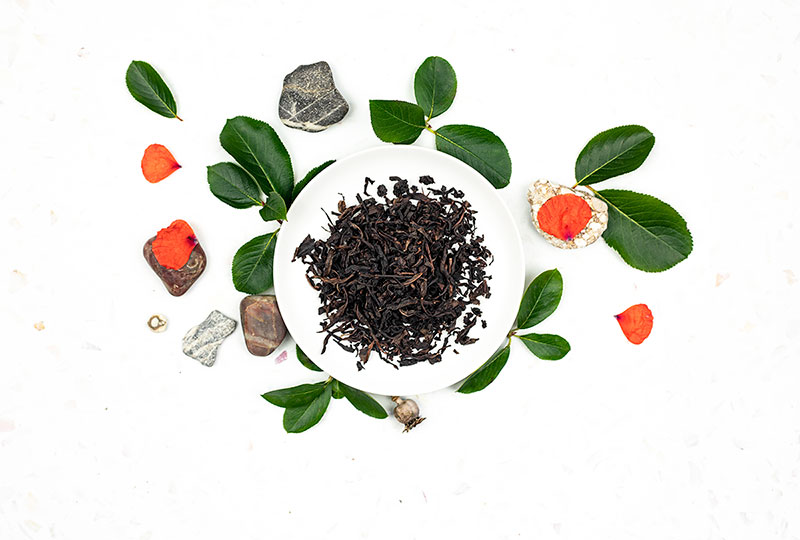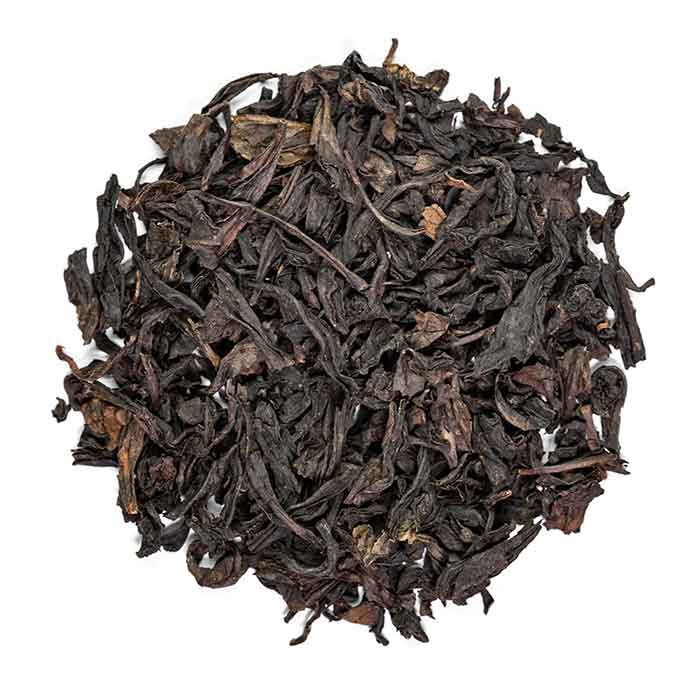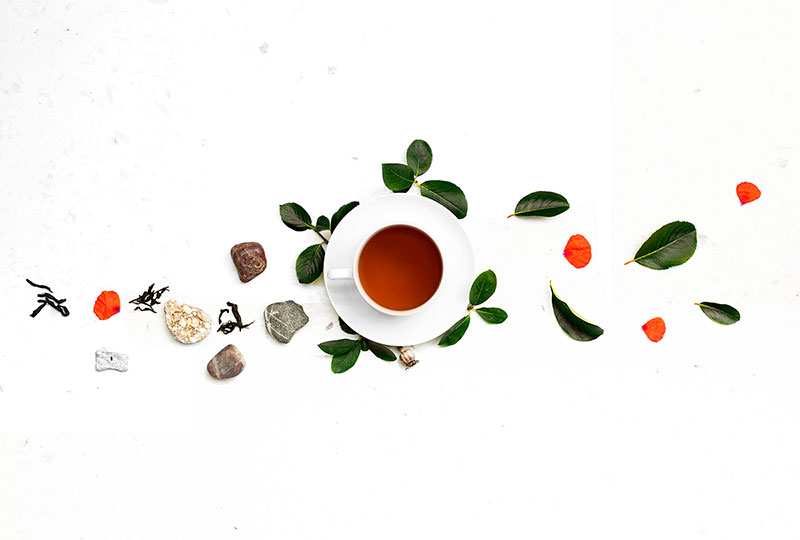Wuyi Rock Tea Guide
The best teas in China are often linked to famous mountains. Wuyi is one of them. Except being home to the famous Lapsang Souchong black tea, Wuyi is famous for exceptional oolong teas – rock oolongs or yancha. Read what is rock oolong, how to brew it and what are some of the most important and famous types.
What is rock tea?
Rock tea or yancha is a category of Chinese oolong tea made from Camellia sinensis tea plant grown in the Wuyi Mountains range in Fujian province. One of the reasons they are called “rock teas“ is because they are grown on a rocky terrain. Rock tea is grown on different altitudes, all of which are less than 1000 meters high, but depending on the altitude, soil can be more or less rocky. What makes these oolongs exceptional and famous is a unique mineral note. Rock tea usually has a milder or stronger charcoal roasted flavor and twisted leaves. Leaves are more than often dark and big. They are often heavily oxidised, thus closer to black tea in flavor and color.
Many Wuyi teas have interesting names and a legend behind it. They have a very long history and were first mentioned even in some Chinese tea classics.
Health Benefits of drinking Wuyi tea
Because Wuyi rock tea is a medium to heavily oxidised oolong, it has similar health benefits as other oolong teas. Potential benefits are:
- Aiding weight-loss
Oolong tea is often considered one of the best „weight loss“ teas, better than green or black tea. Although there is still no miracle drink to help you lose weight without any effort, adding oolong tea to your diet may help. Studies showed that drinking oolong may help reduce body weight and accumulated fat tissue,[1] lower bad cholesterol[2] and increase energy expenditure[3]. - Improving bone and teeth health
Drinking oolong tea may help with keeping bones healthy and strong. Studies showed that oolong tea may help increase bone strenght[4], prevent dental plaque[5] and help keep teeth healthier. - Brain health and de-stressing
Oolong tea contains both caffeine and L-theanine. When combined, they may increase alertness but offer a calming effect too. Furthermore, studies showed that 3 cups of tea per day may have great long-term benefits for the brain and reduce the risk of diseases such as Parkinson’s disease[6] and ischemic stroke[7]. - Heart health
Research showed that oolong tea may help reduce vascular inflammation,[8] help regular high blood sugar[9] and could potentially provide benefits for people with type 2 diabetes.
How to brew Wuyi rock tea
Rock teas are full of flavor and you can brew them using different brewing techniques. To truly enjoy yancha or rock tea, brew it using the gongfu technique or multiple steeping technique. This method requires more tea leaves, less water, shorter infusions and smaller teaware. About 5 grams of tea should be enough for ½ cup of water (or around 100 ml). Bring water to a boil, preheat your teaware by pouring boiled water in and out. Now you are ready to start with steeping. Place the tea leaves into the teapot. Take a deep breathe and enjoy the scent of the dry leaves in the hot teapot first. Pour water over the leaves. First infusion should be very short, 20-30 seconds depending on how hot the water is. Generally, it should be around 203°F.
Alternatively, if you want to make brewing simple and easy, use the regular western brewing technique. Use about 2-3 grams of tea per cup of water and steep for 2-3 minutes at 185°F- 194°F.

Qi Lan Wuyi oolong tea
What does rock tea taste like?
What makes rock tea unique is a special mineral note that can be more or less pronounced, depending on the type, processing and terroir. The best rock teas will have a long-lasting flavor, sweetness and a pronounced mineral note. They will be well-rounded and full of character. To extract the best flavor, always experiment with brewing styles, temperatures, water-leaf ratio and steeping time.
There are many different types of rock tea, and some of the most popular ones are:
- Da Hong Pao or Big Red Robe or Red Robe oolong with fruity, floral, mineral and roasted notes
- Qi Lan or Rare Orchid with sweet and lightly roasted notes
- Rou Gui oolong or Cinnamon oolong with sweet, fruity, flowery and cinnamon notes
- Tie Luo Han oolong or Iron Arhat oolong with full-bodies, sweet, floral, mineral and roasted notes
- Shui Xian oolong or Water Fairy oolong with roasted, airy, flowery and mineral notes
- Bai Ji Guan oolong or White Cockscomb oolong with ripe fruit, floral and sweet notes

Red Robe Wuyi oolong tea
Red Robe oolong
The most famous one is Red Robe oolong, a tea that’s been on the top 10 Famous Chinese Teas list for many years. Da Hong Pao is one of the most expensive teas in the world. Legend has it that a Ming dynasty emperor took some tea leaves from tea bushes while visiting Wuyi. He rushed home to see his ill mother and forgot about the leaves in his pocket. Upon return, he made a tea from those same leaves, gave it to his mother and was suddenly cured. All tea bushes from which he took the leaves were named royal.

Red Robe oolong tea from Fujian
And here is the incredible part – some of those original mother tea bushes are still growing in Wuyi. However, they are protected and not used for commercial purposes anymore. All other Da Hong Pao oolong can come from cuttings, may be blended or even made from other tea leaves harvested outside of Wuyi area.
Whichever Wuyi tea you choose, there’s no doubt they will surprise you with the flavor, character and scent of this incredible leaves.
Disclaimer: This article is for informational purposes only. It’s not intended to replace medical advice, diagnosis or treatment. Every person is different and may react to different herbs and teas differently. Never use teas or herbs to treat serious medical conditions on your own. Always seek professional medical advice before choosing home remedies.
References:
[1] https://www.ncbi.nlm.nih.gov/pubmed/31062778
[2] https://www.ncbi.nlm.nih.gov/pubmed/24229494
[3] https://academic.oup.com/jn/article/131/11/2848/4686734
[4] https://www.ncbi.nlm.nih.gov/pmc/articles/PMC3831545/
[5] https://www.ncbi.nlm.nih.gov/pubmed/8033186
[6] https://www.ncbi.nlm.nih.gov/pmc/articles/PMC4055352/
[7] https://www.ncbi.nlm.nih.gov/pmc/articles/PMC4055352/





